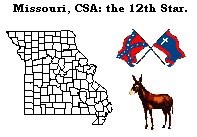
On the 2nd the Federal Congress passed the first national income tax in American history, taxing 3% on incomes over $800. The necessity of funding the massive war costs forced this decision. On August 7th Confederate troops burned the city of Hampton to prevent northern troops from getting anything of value in the town. Union troops occupied Hampton and Newport News and held onto them for the rest of the war. One of the largest battles of the war west of the Mississippi was fought on the 10th at Wilson's Creek, Missouri. Most of the states' militia marched south and joined with Confederate forces. A Union army attempting to stop them met defeat at Wilson's Creek.The future of Missouri was uncertain while both sides regrouped. On the 19th the Confederate Congress admitted Missouri to the Confederacy, although the state never officially seceded. The pro-southern governor and most of the state militia had fled to join Confederate forces in upper Arkansas. In their wake a pro-union faction took control of the government and the state's largest city, St. Louis. A joint Union army-navy force took several forts on the outer banks of North Carolina on the 28th. Cape Hatteras also fell to the Union troops. All along the coast, it seemed, there were cracks developing the Confederacy's coastline. Monotony set in for the units of the army stationed in northern Virginia after the excitement of the battle of Manassas faded. Troops like the 11th Virginia spent their time on guard duty and in drill in camp, waiting for the army's next move. Back home, the women of Lynchburg made winter clothing for their husbands, brothers, and sons, and prepared packages of food and gifts. On August 8th the Liberty Guards officially became Company A of the 46th Virginia Regiment (later re-designated as Company B). The men of the 46thVirginia, from Appomattox and nearby counties, spent a rough month marching in western Virginia. Rain made conditions miserable, and then measles broke out in camp. By August over 10,000 runaway slaves were camped in shanties around Fortress Monroe, at Hampton. Union General Benjamin Butler gave shelter to these runaway slaves, and employed them doing manual labor for the army. In running to join the Union army, and in embracing them, the runaway slaves and Butler brought the issue of slavery to the forefront. Preserving the Union, not freeing salves, was the north's official war goal, though there had always been a vocal yet small segment that pushed for action against slavery. Now political pressure began to build on President Lincoln to do something about the institution. Momentum grew in the coming months as runaway slaves appeared where ever Union forces conquered Confederate territory. Some Confederate soldiers and officers brought their slaves with them when they joined the military. Polk Miller of Lynchburg received a letter from his father saying, "I hear you are likely to have a big battle soon, and I write to tell you not to let Sam go into the fight with you. Keep him in the rear, for that Negro is worth a thousand dollars. Your loving father." Captain Charles Blackford, also of Lynchburg, wrote, "My servant was a free Negro named John Scott. He had been a servant for Captain Gardener in the Mexican war, and . . . served me most faithfully throughout the whole of the war." |
Last updated: March 31, 2012
